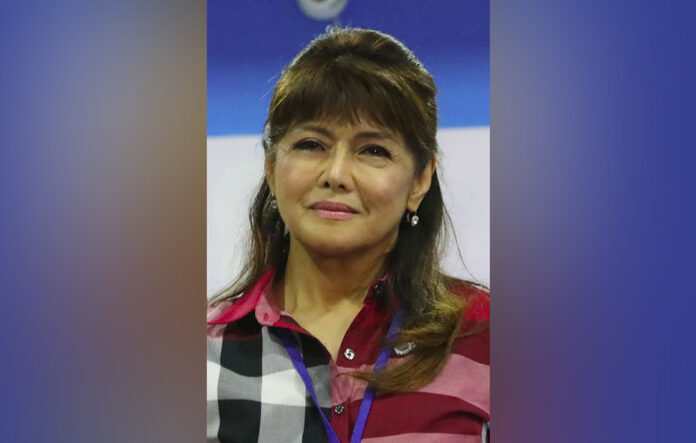SENATOR Imee Marcos on Saturday disclosed a move to block certain big companies from procuring vaccines for their employees, warning this will also cripple the Duterte administration’s immunization program amid an alarming spike in Covid-19 cases.
Marcos said a draft order about to be pitched by the National Task Force against Covid-19 and the Department of Health to President Duterte for approval, targets some of the biggest makers of liquor, tobacco and infant milk.
She noted that the government had been deriving multibillion revenues in excise taxes from tobacco and liquor companies, so blocking them from buying vaccines to protect their employes is bad policy. But the worse part is that it will cripple the government’s own effort to rush the vaccination of millions of people since private firms donate half of their procured supply to the State, she said.
In a statement, the senator disclosed she “got hold of a draft administrative order, about to be passed on for President Duterte’s signature, that will prevent the country’s largest manufacturers of tobacco, milk, sugar, soda, and alcohol, as well as multinational firms based in the Philippines from assisting the government’s national vaccination program.”
This means, the lawmaker pointed out, “the entire San Miguel group, the whole Lucio Tan group, Puregold, Nestlé, Destileria Limtuaco, all soft drinks producers, Tanduay, Ginebra, White Castle, et cetera.”
Marcos warns that if big firms are barred from buying their vaccine supply, the availability of additional vaccines for the public will be imperiled, because under the present setup, businesses that procure vaccines directly must donate 50 percent of the supply to the government.
“Kapag di makabili ng mga bakuna itong mga malahiganteng kumpanyang ito, na 50 percent ido-donate sa publiko dahil walang pera ang gubyerno, paano pa tayo makakadagdag ng bakuna [If these giant companies cannot buy vaccines, 50 percent of which will be donated to the public because the government lacks funding, how else will we acquire more vaccines]?” Marcos wanted to know.
The slow pace of immunization has been a cause for concern as the country, particularly the National Capital Region (NCR), has seen a spike in active new daily cases, which hit over 7,999 on Friday, and health facilities are nearing critical point in terms of capacity for treating cases.
The quick spread has caused many key government agencies to declare lockdowns as state employees are among the hardest hit by the virus.
Marcos aired serious concerns that the administrative order will “not only slow down the vaccination of the targeted 70 percent of Filipinos to achieve herd immunity this year but also diminish the government’s ability” to generate much-needed revenue to fund its national vaccination program.
‘Total wipeout’
“We are about to see a total wipeout of the 50-percent donation of vaccines by these large companies,” Marcos warned, noting these are “donations which are stipulated in each tripartite agreement among private entities, vaccine manufacturers and the government.”
Marcos pointed out that these donor companies are “the biggest contributors to the government coffers” through excise taxes, adding she found it “ironic that this administrative order was conceived amid a shocking spike in Covid-19 cases and just weeks away from the tax payment deadline in April.”
The senator said Section 5 of the administrative order states that the NTF and the DOH shall review all requests of private entities to procure vaccines “to ensure that private entities who will be part of the agreement are not in any way related to the tobacco industry, products covered under EO 51 series of 1986 or the ‘National Code of Marketing of Breastmilk Substitutes, Breastmilk Supplement and Other Related Products’ or other products in conflict with public health.”
A copy of the draft administrative order of implementing rules and regulations for certain provisions of RA 11525 (the national vaccination program) obtained by BusinessMirror also showed that under Item 6 of Specific Guidelines, “The DOH, in its review, shall ensure that the tobacco, formula milk, and other industries in conflict with the interest of public health will not be part of this endeavor, pursuant to existing DOH guidelines and issuances.”
Marcos also noted that the Binondo-based Chinese newspapers were reporting that NTF chief Carlito Galvez Jr. disapproved the vaccine importation requests of members of the three largest Filipino-Chinese chambers of commerce.
The reports, she said, echoed Foreign Affairs Secretary Teodoro Locsin Jr.’s lament via Twitter that the Federation of Filipino Chinese Chambers of Commerce and Industry Inc. (FCCCII) was being blocked from importing 500,000 doses of the Chinese vaccine maker Sinovac after a deal had already been signed. In Marcos’s view, “The administrative order totally contradicts the “shared responsibility” and collaboration the government has sought from the private sector and other organizations through its Philippine National Deployment and Vaccination Plan for Covid-19.”
Image credits: PNA/Avito C. Dalan
Read full article on BusinessMirror



